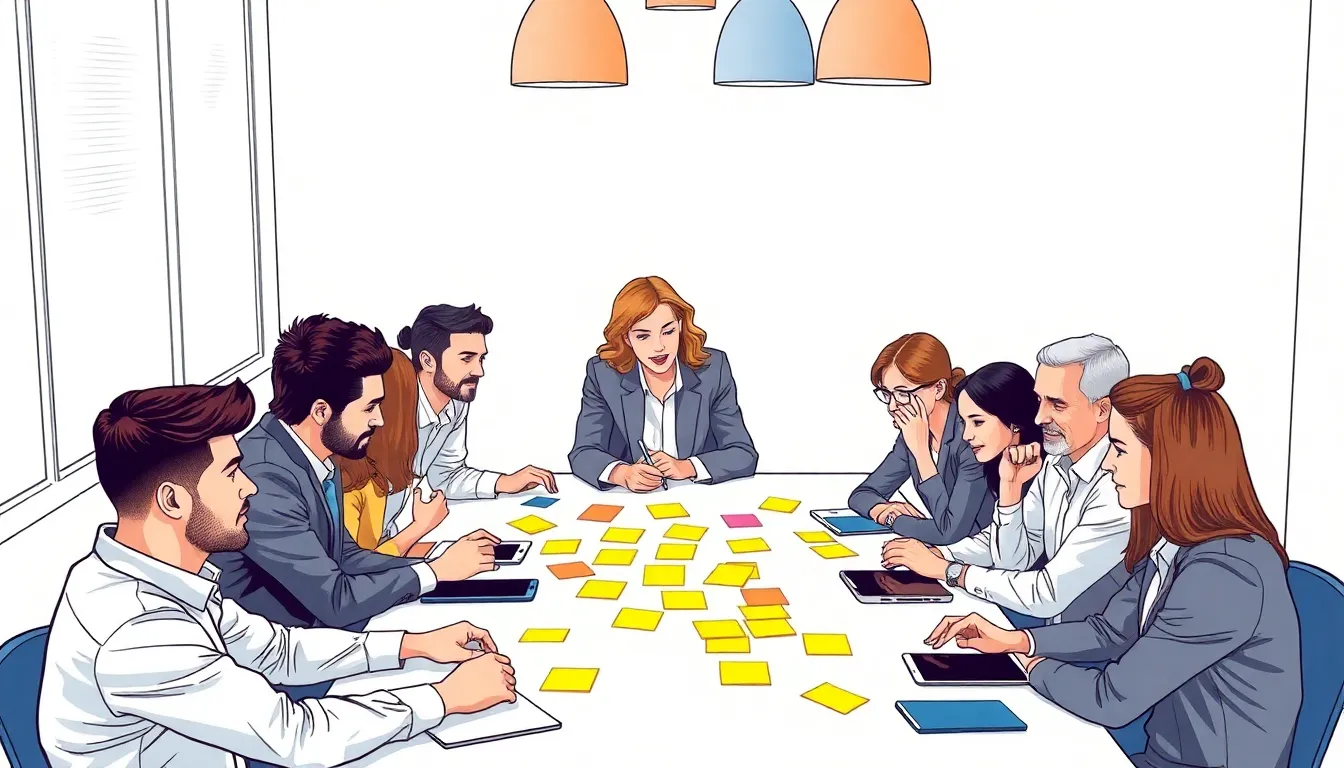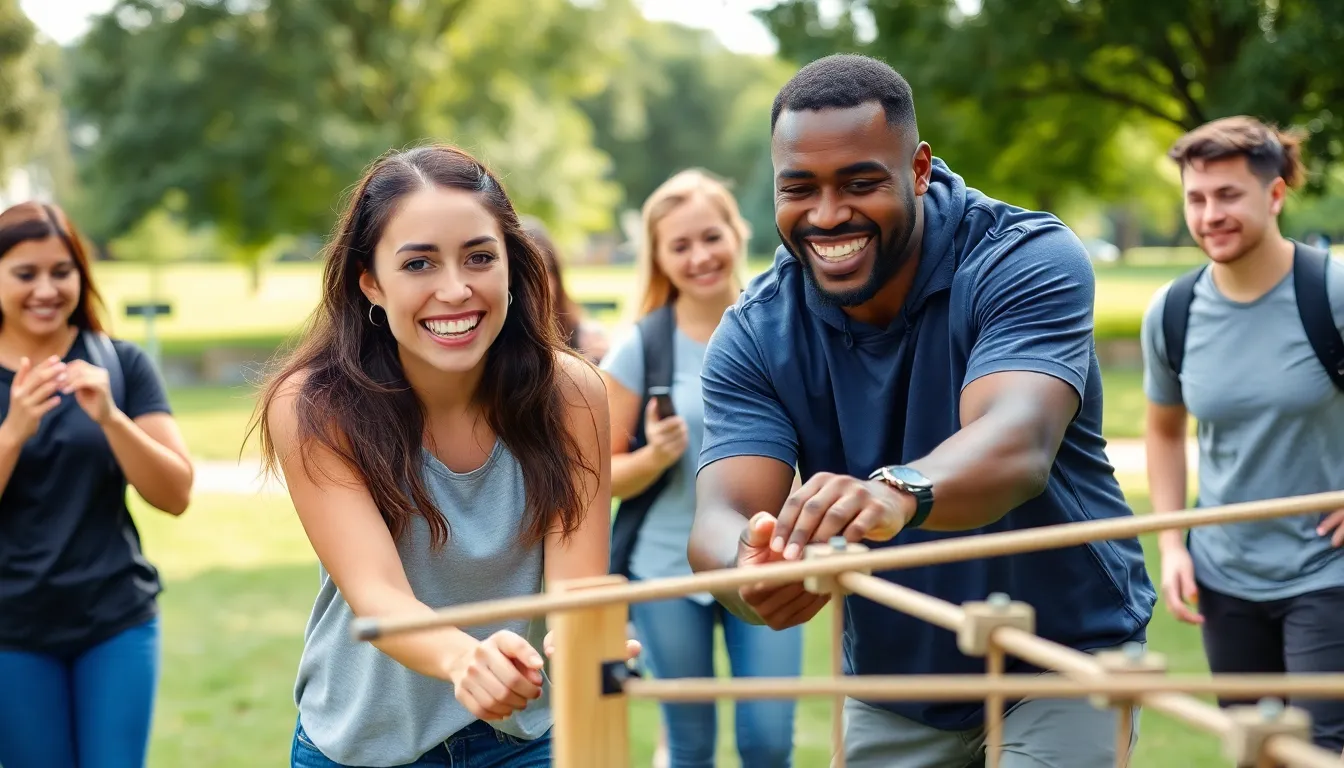In today’s fast-paced world, teamwork isn’t just a buzzword; it’s a survival skill. Imagine trying to assemble IKEA furniture solo—chaos, confusion, and maybe a few choice words later, you realize collaboration is key. That’s where collaborative skills training swoops in like a superhero, transforming individuals into cohesive teams ready to tackle any challenge.
This training isn’t just about learning to share a coffee machine; it’s about mastering the art of communication, problem-solving, and conflict resolution. With the right skills, teams can turn potential disasters into triumphs, all while keeping the office banter lively. So, if they want to boost productivity and bring a little fun back into the workplace, embracing collaborative skills training could be the secret weapon they never knew they needed.
Table of Contents
ToggleOverview of Collaborative Skills Training
Collaborative skills training focuses on enhancing individuals’ ability to work effectively in teams. This training aims to develop essential skills such as communication, problem-solving, and conflict resolution. Team members can overcome challenges more efficiently with increased collaboration.
Participants engage in various activities that foster teamwork. These activities often include role-playing, group discussions, and real-world problem-solving exercises. Interactive elements make the training dynamic and applicable to the workplace.
Specific skills targeted during the training include active listening and assertive communication. Team members learn to express their ideas clearly while considering others’ perspectives. By practicing these skills, they improve overall team dynamics.
Conflict resolution techniques also play a crucial role in collaborative skills training. Participants learn to identify issues early and address them constructively. This proactive approach reduces misunderstandings and promotes a positive work environment.
The benefits of collaborative skills training extend beyond individual team members. Organizations can experience increased productivity and innovation as teams become more cohesive. Furthermore, an enjoyable workplace atmosphere can emerge when team members feel valued and understood.
Overall, adopting collaborative skills training serves as a strategic asset for enhancing teamwork. Teams equipped with effective collaboration skills tend to achieve their goals more successfully. Organizations may find that investing in this training yields significant long-term benefits.
Importance of Collaborative Skills

Collaborative skills play a crucial role in the modern workplace. Effective teamwork relies on these skills to foster productive and positive interactions among team members.
Enhancing Team Dynamics
Team dynamics improve significantly through collaborative skills training. Participants learn to leverage their strengths while acknowledging areas for growth. Building trust among members promotes open dialogue, enabling groups to solve complex problems. Engagement in exercises like brainstorming sessions helps cultivate shared goals. When everyone contributes, innovation thrives, leading to higher levels of creativity. A cohesive team consistently achieves better results, demonstrating the power of collaboration.
Improving Communication
Effective communication stands at the core of successful teamwork. Collaborative skills training prioritizes active listening, encouraging participants to focus on others’ ideas. Clear expression of thoughts reduces misunderstandings, ensuring everyone stays on the same page. Assertive communication techniques help individuals convey their perspectives confidently. Regular practice through simulations reinforces these skills, making participants more proficient in real-life situations. Improved communication leads to stronger relationships and a more harmonious work environment.
Key Components of Effective Training
Effective collaborative skills training incorporates essential components that enhance team performance. Interactive learning methods and real-world scenarios are critical components of such training programs.
Interactive Learning Methods
Engaging participants through interactive learning methods promotes active involvement and retention. Activities like role-playing and group discussions encourage dialogue and collaboration among team members. Utilizing technology facilitates virtual simulations, allowing remote teams to experience realistic teamwork scenarios. Hands-on workshops provide participants with immediate feedback, reinforcing concepts and skills. Fostering engagement boosts motivation and reinforces the importance of collaboration in achieving shared goals.
Real-World Scenarios
Integrating real-world scenarios into training enhances practical application of collaborative skills. Participants tackle authentic challenges that mirror their work environment, increasing relevance. Analyzing case studies offers insights into successful teamwork strategies and common obstacles that teams encounter. Exploring these situations encourages critical thinking and strategic problem-solving, essential for effective teamwork. Utilizing these scenarios equips participants with tools to navigate future collaboration, ensuring they can apply their skills in their day-to-day responsibilities.
Benefits of Collaborative Skills Training
Collaborative skills training brings several advantages, enhancing both individual and team performance. Participants experience direct benefits that contribute to a more effective workplace.
Increased Productivity
Enhanced communication skills lead to increased productivity. Teams that engage in collaborative training communicate ideas clearly, minimizing the time needed to resolve misunderstandings. Improved problem-solving enables team members to tackle challenges efficiently, ensuring that projects stay on schedule. Leveraging strengths within a team fosters a sense of unity, allowing responsibilities to be shared cohesively. Organizations witness a measurable increase in output as trained teams work smarter and with greater alignment towards common goals. Enhanced creativity flourishes in an environment where team members feel comfortable sharing their insights.
Better Conflict Resolution
Collaborative skills training equips participants with effective conflict resolution techniques. Understanding and addressing issues constructively reduces the likelihood of workplace tensions escalating. Team members learn to approach disagreements calmly, facilitating open discussions that lead to constructive outcomes. By practicing techniques such as active listening and assertive communication, individuals express their viewpoints while respecting the perspectives of others. Ultimately, fostering an environment where conflicts are addressed healthily cultivates trust and strengthens team dynamics. Organizations benefit from a culture that promotes collaboration and harmony, enabling teams to focus on achieving shared objectives.
Investing in collaborative skills training is essential for teams striving to thrive in today’s dynamic work environment. By enhancing communication and conflict resolution skills, organizations can create a culture of collaboration that drives productivity and innovation. The interactive nature of this training not only fosters strong relationships but also equips team members with the tools to navigate challenges effectively.
As teams practice these skills in real-world scenarios, they develop a deeper understanding of each other’s strengths and perspectives. This collaborative approach leads to improved dynamics and a more harmonious workplace. Embracing collaborative skills training can ultimately transform how teams work together, paving the way for shared success and long-term organizational growth.







